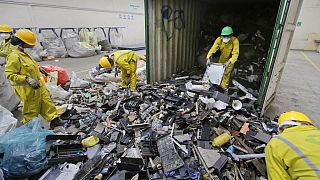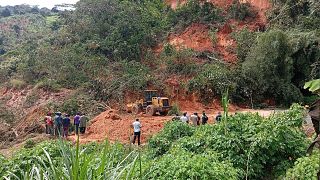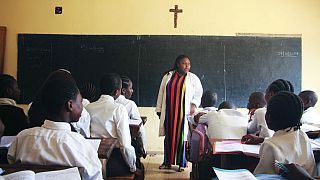Cameroon
Under a patched parasol protecting him from the sun, Ismaël Alioum rummages through piles of electronic waste in search of materials to recover: in the scrap metal district of Yaoundé, the capital of Cameroon, informal activity is in full swing while an NGO proposes a sustainable alternative to manage this waste.
In Cameroon, the processing of the tons of electronic waste produced each year is mainly in the hands of informal actors, trained on the job, "by observing from day to day", admits Ismael Alioum.
According to the scrap dealer, Chinese and Indian operators are very active in the sector and are mainly supplied by informal actors.
Without gloves or a protective mask, the 46-year-old man hammers an old voltage regulator. "Iron and plastic are very sought after," he explains, his hands full of mud. Beside him, three young men with screwdrivers and knives are also attacking old electronic devices.
"They take out what is useful and abandon the rest in nature, including what is toxic for the environment," deplores Armel Poughela, director of Solidarité technologique, an NGO that offers an alternative to the informal sector by giving a new life to this equipment in compliance with environmental standards.
"Electronic waste contains harmful substances that can cause illnesses such as cancer in humans when released into the environment," says Didier Yimkoua, an environmental activist and president of the NGO World Action Phyto Protection.
"When scrap dealers break cathode ray tubes, there is mercury or lead that escapes, which is dangerous for them and for the population," he says.
In 2012, Cameroon adopted a law on electronic waste management, making Solidarité technologique, founded in 2011, one of the first operators to obtain state approval to carry out this activity. Some 25 operators benefit from it, but only two are active in the field.
The NGO recovers defective devices from companies and households, "to avoid that the waste ends up in the trash," explains Augustin Kenné, head of the dismantling section.
- Objective 5,000 tons -
Collections are now made by appointment thanks to the NGO's awareness-raising work, says Camille Ndomo, an employee of Solidarité technologique, who is loading onto his tricycle a gas hob, an LCD screen and a landline telephone that have just been recovered from a house in the Ewonkan district, east of Yaoundé.
In the association's premises, a dozen employees armed with gloves and masks sort, wash, and then dismantle old screens, computer carcasses, and electrical wires, before repairing them to sell them at a lower cost in their store.
According to Armel Poughela, Cameroon is the first African country to have legislated on the management of electronic waste. A binding law regulates the activity and requires environmental permits for anyone wishing to work in this sector.
"Over the last three years, we have collected an average of 130 tons of waste per year," says Armel Poughela, who specifies that "about 50" tons of waste have been "recovered" (reused) or destroyed.
The waste that the NGO cannot destroy or transform on site is sent to partners in Douala, the economic capital, and in Europe where expertise in the field is more developed.
There is no study to evaluate the amount of electronic waste produced by companies and households in Cameroon, but recycling remains low, "because the activity is not profitable," says Armel Poughela, particularly because of the lack of infrastructure. "We need to reach a volume of 5,000 tons per year to cover the costs," he adds.
To achieve this goal, the NGO is counting on the construction of a plant to crush and incinerate waste that cannot be recovered. "We have obtained a one-hectare site in Douala, but we do not yet have the necessary funding," concludes Mr. Poughela.











01:41
Kenya relocates 50 elephants to larger park to ease overcrowding
02:00
Kenya: Meet Mombasa disabled women who earn a living sewing reusable sanitary pads
02:10
Kenya: Islanders upcycle washed up plastic waste into boats
02:29
Kenyan farmers turn to sustainable methods to combat soil acidity
02:24
Community cry foul over pollution caused by lead factory in the Congo
Go to video
Plastic pollution: what to know from the Ottawa conference